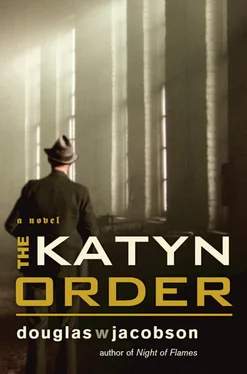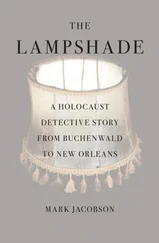Adam clapped Bravo on the shoulder, slipped on the SS officer’s coat and hat, and climbed in the backseat.
Bravo pulled on the driver’s coat, which was a tight fit, squeezed behind the wheel and brought the auto’s powerful engine roaring to life. “You’d better keep down,” he said, as he eased the Mercedes out of the shed. “The first kilometer is the most dangerous, while we’re still in AK territory. Most of the regular commandos in this sector know about the car. But in all the chaos, new ones are coming and going every day, and this thing’s a hell of a target.”
“Christ, that’s just great,” Adam grumbled as he slumped low in the backseat, contemplating the irony of getting killed by his fellow commandos after managing to survive four years of warfare.
“Ah, we’ll probably be fine,” Bravo said and stomped on the accelerator, sending a shower of gravel and rocks in all directions as the long, black motorcar bolted forward. “Let’s go find some fuckin’ Russians!”
Though darkness was on their side, Bravo drove dangerously fast, screeching around corners and dodging piles of debris. The big car sped down the broad thoroughfares of Nowy Swiat and Wazdowskie Avenue, then made a hard left turn and shot past an AK barricade near Lazienki Park. Bravo shouted out the window at the surprised commandos, “Poland fights! Poland fights!”
A few minutes later they emerged “safely” into a German-held section of the Mokotow District. Bravo slowed down as they continued on, waving occasionally at groups of Wehrmacht soldiers, SS troopers and the ever-present conscripted Ukrainians, who huddled near their own bonfires, drinking schnapps and eating tinned sausage, waiting for dawn and another day of stomping out the Polish insurgency.
Adam sat up straight, adjusted his cap and looked out the rear window at the enemy soldiers, wondering what they thought. Did they think it was worth it, wasting all this time, ammunition and their own lives to obliterate a city that was already lost? They had to know that every day they stayed here, they came closer to being surrounded and obliterated themselves by the hundreds of thousands of Russian troops camped just a few kilometers away on the other side of the river. Adam knew the Germans were famous for following orders, but this was a death wish, imposed on them by the lunacy of their Fuhrer. He sighed and slumped back in the soft leather seat and rubbed his temples. It all depended on the Russians, and whether or not they would finally decide to enter Warsaw and help the AK end this madness. And that, Adam guessed, he would find out soon enough.
They drove south along the broad, tree-lined avenues of the Mokotow District. The vast expanse of parks and open areas, stately mansions and modern, upper-class apartments—only a few of which showed any evidence of the conflict raging in other parts of the city—passed like a mirage outside the Mercedes’ windows. It seemed another world from the brutal chaos of the City Center or Old Town, though no one was on the streets save for German soldiers. Most of the windows were dark and there were no lights anywhere. Adam guessed that the civilians in the area, if they hadn’t yet taken to their cellars, were lying low.
As they continued south from Mokotow through the Wilanow District—the summer residence of Poland’s kings—Adam remembered coming there for the first time as a boy with his uncle. They had toured the section of Wilanow Palace that had been turned into a museum. Though it was too dark to see any of it now, he recalled the Asian artwork hanging in parquet rooms the size of most houses, the vast gardens and marble fountains. He had especially loved the ornately sculpted sundial relief on the palace’s south wall and Uncle Ludwik’s patient explanation of how it worked.
Eventually the broad streets turned into gravel lanes winding through orchards and farm fields, past wooden barns and thatched-roof cottages. When they drove through the last German checkpoint well south of Wilanow, Bravo waved to the weary-looking Wehrmacht soldiers without even slowing down.
“Do you have enough petrol?” Adam asked. There was precious little available in Warsaw to anyone except the Germans.
“The tank was full when we got the car,” Bravo said with a shrug. “We’ve got enough for this trip. After that, who knows? Hell, we’ll probably all be dead in a few weeks anyway.”
Twenty minutes later they arrived at a dusty crossroads with a thatched-roof farmhouse on one corner and a tidy brick church on the other. Bravo turned left onto a rutted, dirt road, overgrown with grass, and headed east toward the Vistula River. After another few minutes, he rounded a curve, and the auto’s headlight beams illuminated the rendezvous point.
Bravo brought the auto to a stop, and Adam leaned forward, looking through the windshield. It was an abandoned barge dock, nothing more than a cracked and buckled concrete pier extending perhaps ten meters into the river. Ancient truck tires hung from chains attached to rotted wood posts, and the rusted-out hulk of what was most likely the last barge sat mired in the muck. The night air was heavy with the odor of dead fish and rotting algae.
Bravo turned around. “Well, this is as far as I go,” he said quietly. The big man’s good-natured bluster was now replaced with a note of concern. He reached over and clasped Adam’s hand. “I’ll be right here tomorrow night at this same time. I hope you are too.”
Adam nodded silently and stepped out of the car.
As the tail lights of the Mercedes disappeared around the bend, Adam started down the rutted road toward the barge dock, his right hand resting on the butt of the Walther P-38 strapped to his waist. Colonel Stag had assured him that the Russians knew he was an American and were prepared to receive him, but when Adam spotted the three figures emerging from the shadows, he tightened his grip on the pistol.
He stopped and watched carefully as the figures approached, trying to identify their uniforms in the moonlight. A moment later he realized they were Red Army regulars and not NKVD. He breathed a bit easier, but since two of them carried submachine guns leveled directly at his chest, he kept his hand on his pistol.
The trio stopped three meters away and stood silently for a moment. The one in the middle between two Red Army troopers was an officer. He was tall and very thin with a patch over his left eye. After another moment of silence he finally asked, “Amyerikanyets?”
Adam nodded. “Yes.”
“Gavaŕit pa rúski?”
“No. Do you speak English?”
The officer took a step forward and asked in perfect English, “Are you looking for the bridge?”
It was the question he’d been told to expect, and Adam answered, “I’m told the bridge is unsafe. But I require passage to Praga.”
The officer eyed him carefully, then said something in Russian to one of the submachine-gun-toting troopers, who stepped up, relieved Adam of the Walther and searched him thoroughly. The Russian trooper slipped the pistol into his own pocket, then motioned for Adam to proceed toward the water’s edge where a rowboat was beached.
Adam climbed into the boat and sat in the prow while the officer took a seat aft with one of the Red Army troopers, who continued to point the submachine gun at him. The other trooper sat in the middle and took up the oars.
Without another word they rowed across the Vistula River under a dark sky, illuminated only by a half moon and the glow of fires from Warsaw.
Toward evening of the following day, General Kovalenko sat at a metal table in his sparsely furnished field command tent. His tank corps commander, Colonel Roskov, was on his left and Captain Andreyev on his right. Across the table sat his visitor, the American emissary from Warsaw. They had kept him isolated and under guard since his arrival the previous night. He was a scrawny man with thin hair and the wire-rimmed spectacles of a schoolteacher. Yet, as Kovalenko studied him, there was a hard look in the man’s eyes and a bearing about him that suggested he was not what he seemed.
Читать дальше












